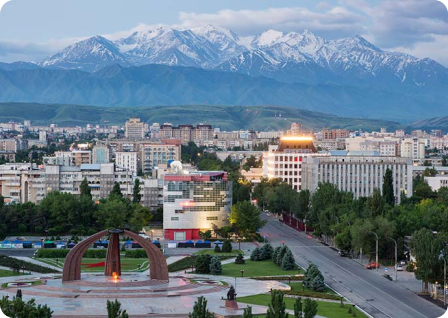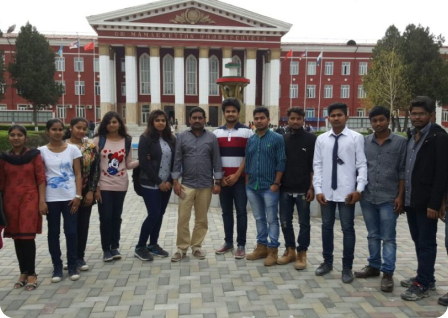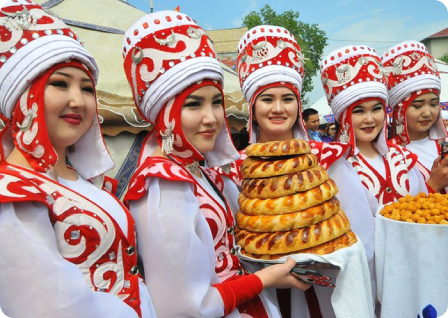


MBBS in Kyrgyzstan has always been the top destination for Indian students who are seeking to study MBBS Abroad for higher medical education for the last few decades. It attracts thousands of Indians as well as International students every year. The country offers a high standard of medical education at an affordable cost, making it an ideal choice for those aspiring to become doctors.The duration of medical courses is 6 years, including a 1-year internship program providing students with both theoretical knowledge and practical experience., The country is home to six National Medical Commission (NMC) approved medical universities that provide high-quality education at an affordable fee. These Universities are recognised by prestigious international organizations such as WHO, NMC, FAIMER, and the Ministry of Health and Science Education of Kyrgyzstan.
MBBS in Kyrgyzstan meets the students' need for market demand and market supply. Students can take all the facilities from the colleges and medical universities in Kyrgyzstan and it will help them to pursue their education in Kyrgyzstan. Currently more than 10,000 Indian students are pursuing their medical education in Kyrgyzstan.Top medical universities in the nation are authorized by WHO, NMC, FAIMER, and the Ministry of Health and Science Education of Kyrgyzstan contributing to the growing number of international students attracted to the country. The universities in Kyrgyzstan not only provide an internationally recognized curriculum but also maintain a strong focus on practical training, ensuring that students are well-prepared to work in diverse healthcare settings globally.
| Detalis | Attributes |
|---|---|
| MBBS in Kyrgyzstan duration | 6 Year |
| Medium of Instruction | English |
| Recognitions By | WHO, NMC, FAIMER, and Ministry of Health and Science Education of Kyrgyzstan |
| Top Medical Universities | |
| MBBS in Kyrgyzstan Cost | |
| Cost of Living | |
| Entrance Exam | NEET EXAM |
Kyrgyzstan, located in Central Asia, offers a wide range of unique and exceptional experiences for students, particularly those interested in that country which is rich in natural beauty and cultural heritage. The country is famous for its mountains, landscape, mountain peaks, and provides students with access to outdoor activities and adventure. If we talk about the education system, Kyrgyzstan has made significant steps in recent years , especially in the last few years.
The country is home of several Universities with notable institutions such as American University of Central Asia (AUCA), Kyrgyz National University, and the International University of Kyrgyzstan offering programs in various fields like business, engineering, social sciences, and medicine. These universities are often recognized for their international faculty and diverse student population, making Kyrgyzstan an attractive destination for global learners.The language of instruction at many institutions is Russian or Kyrgyz, but several universities offer courses in English, particularly for graduate programs.

The Kyrgyzstan MBBS eligibility criteria should be considered by every candidate who wishes to take admission to Bangladesh MBBS colleges.Here is Kyrgyzstan MBBS eligibility criteria that ought to be pursued by each applicant.
The mbbs admission in kyrgyzstan complete process are as follows:
As a candidate applying for MBBS in Kyrgyzstan, it is important that one has the details on intakes by medical universities.
Below are the necessary documents that students need to submit in taking admissions in Kyrgyzstan University:
| Document | Description |
|---|---|
| Passport | Valid for at least 18 months |
| Passport-size Photographs | 8-10 recent colored photographs |
| 10th Grade Marksheet | Copy of the 10th standard mark sheet |
| 12th Grade Marksheet | Copy of the 12th standard mark sheet |
| NEET Scorecard | Copy of NEET qualification score (if applicable) |
| Birth Certificate | Proof of date of birth |
| Medical Certificate | Certificate of good health from a doctor |
| HIV Test Report | Certificate stating non-infection of HIV |
| Migration Certificate | From previous institution if required |
| Affidavit (if necessary) | Declaration for guardian’s financial support |
Kyrgyzstan's medical universities have a diverse variety of undergraduate and post graduate programs that emphasise on practical training and clinical exposure.The courses are designed to equip students with the necessary skills to become competent healthcare professionals in a global setting. MBBS duration in Kyrgyzstan is 6 Years check out the below table which is all about.
| Course | Duration | Focus |
|---|---|---|
| MBBS | 5-6 years | Medical training in diagnosis, treatment, and prevention. |
| BDS | 5 years | Dental care, surgery, and oral health. |
| Pharmacy | 4 years | Drug development, testing, and healthcare use. |
| Nursing | 4 years | Nursing practice, patient care, and healthcare management. |
| Physiotherapy | 4 years | Rehabilitation and recovery from injuries. |
| MD | 3-4 years | Specialization in fields like surgery, pediatrics, etc. |
| MS | 3-4 years | Advanced surgical training. |
| MDS | 3 years | Specialization in dental surgery. |
| Public Health | 2-3 years | Health policies, community health, and management. |
Study MBBS in Kyrgyzstan has a updated syllabus for medial students with the modern touch here is the break down of each subjects
| Year | Syllabus |
|---|---|
| 1st year | General Psychology, Human Anatomy, Bioorganic Chemistry, Elective Courses, Internal Medicine and Cytology. |
| 2nd year | Microbiology, Histology, Physiology, Biochemistry, Patient Care, Anatomy, and Psychology. |
| 3rd year | E.N.T., Medical Chemistry, Embryology, Radiology, and Forensic Medicine. |
| 4th year | Pharmacology, Allied Subjects, Surgery, and Community Medicine. |
| 5th year | Gynecology & Obstetrics, Ophthalmology, Infectious Disease, etc. |
| 6th year | Internship under the guidance of senior doctors. |
Institute-wise breakdown of Fee Structure for MBBS in Kyrgyzstan
Talking about the MBBS in Kyrgyzstan fee structure, We have primarily focused on the fees structure of the top medical universities in Kyrgyzstan where a maximum number of international and Indian students are enrolled. Cost of mbbs in kyrgyzstan are mentioned below in table
| University Name | Tuition Fees (USD) | Tuition Fees (INR) | Tuition Fees (KGS) |
|---|---|---|---|
| Osh State Medical University | $4,000 | ₹344,960 | 349,800 KGS |
| Jalalabad State Medical University | $4,200 | ₹362,208 | 367,290 KGS |
| International School of Medicine | $3,500 | ₹301,840 | 306,075 KGS |
| Kyrgyz Russian Slavic University | $3,500 | ₹301,840 | 306,075 KGS |
| Salymbekov Medical University | $2,800 | ₹241,472 | 244,860 KGS |
| Asian Medical Institute | $3,400 | ₹293,216 | 297,330 KGS |
| Kyrgyz State Medical University | $3,400 | ₹293,216 | 297,330 KGS |
Kyrgyzstan is listed among the top countries that provide high-quality medical education for Indian students. Below, we describe various facts that attract thousands of Indian students every year.
MBBS in Kyrgyzstan for Indian students provides affordable and economical hostel facilities to indian students, below are the breakdown of the facilities
Studying MBBS in Kyrgyzstan offers affordable living options for Indian students compared to both Indian and western countries. Below is a detailed breakdown of monthly expenses in Kyrgyzstani Som (KGS) and Indian Rupees (INR):
| Expense | Cost (KGS) | Cost (USD) | Cost (INR) |
|---|---|---|---|
| Shared Accommodation | 5,000–10,000 | 60–120 | 5,000–10,000 |
| Private Apartment | 12,000–25,000 | 140–300 | 12,000–25,000 |
| Food (Meals & Groceries) | 200–400 (per meal) | 2.50–5 (per meal) | 200–400 (per meal) |
| Public Transport | 10–20 (per ride) | 0.12–0.25 (per ride) | 10–20 (per ride) |
| Utilities & Internet | 2,500–6,000 | 30–72 | 2,500–6,000 |
| Total Monthly Expenses | 13,000–27,000 | 160–320 | 13,000–27,000 |
There are so many approved mbbs colleges in Kyrgyzstan few of them are elaborated below
Jalal-Abad State University is a top choice for medical education with 30+ years of experience. Over 3,000 international students study MBBS under 164 expert faculty. The university partners with 27 clinics and hospitals, ensuring hands-on training and internships for practical learning.
| Details | Attributes |
|---|---|
| University Name | Jalalabad State University |
| Founded Year | 1993 |
| Situated in | Jalal-Abad, Kyrgyzstan |
| Entrance Test | Neet exam |
| Tuition Fee in (KGS) | 3,174,545.45 |
| Tuition Fees / Per Year | 4,200 US$ /348,600 INR. |
Kyrgyz State Medical Academy is Kyrgyzstan’s oldest and top-ranked medical university. With 540+ expert faculty, it offers high-quality education and global recognition from NMC, WHO, and FAIMER. The MBBS fees for Indian students are affordable, making it a preferred choice for medical studies.
| Details | Attributes |
|---|---|
| University Name | Kyrgyz State Medical Academy |
| Founded Year | 1939 |
| Situated in | Bishkek, Kyrgyzstan |
| Minimum Qualification | 10+2 with 50% marks |
| Tuition Fee in (KGS) | 4,380,000 |
| Tuition Fees / Per Year | 4,800 US$ 398,400 INR |
The International School of Medicine is a top choice for Indian and international students. It offers quality medical education at affordable fees and welcomes thousands of students annually. Recognized by WHO, NMC, and global health bodies, it ensures excellent training for future medical professionals.
| Details | Attributes |
|---|---|
| University Name | The International School of Medicine |
| Founded Year | 2003 |
| Situated in | Bishkek, Kyrgyzstan |
| Tuition Fee in (KGS) | 5,715.18 |
| Minimum Qualification | 10+2 with 50% marks |
| Tuition Fees/Per Year | 6,000 US$ -519,561.93 INR |
Osh State University is a leading medical institution in Kyrgyzstan. Located in Osh City, it hosts 40,000 students, including 3,000 internationals. Recognized by WHO, NMC, and FAIMER, the university offers quality medical education, making it a preferred choice for aspiring doctors worldwide.
| Details | Attributes |
|---|---|
| University Name | Osh State University |
| Established Year | 1939 |
| Situated in | Osh City Kyrgyzstan |
| Entrance Exam | Neet Exam |
| Tuition Fee in (KGS) | 349,800 |
| Tuition Fees | 4,000 US$- 346,576.21 |
The International University of Kyrgyzstan (IUK) is a leading higher education institution known for its diverse academic programs and international orientation. Established with a vision to provide quality education, IUK offers a wide range of undergraduate and postgraduate courses in various fields, including medicine, engineering, business, and humanities.
| Details | Attributes |
|---|---|
| University Name | International University of Kyrgyzstan |
| Year of Establishment | 1993 |
| NEET | Qualifying Marks |
| Tuition Fee | 6,000 USD |
| Tuition Fee (INR) | ₹519,561.93 |
| Tuition Fee (KGS) | 349,800 KGS |
| MBBS in Georgia | MBBS in Bangladesh |
| MBBS in Kazakhstan | MBBS in Philippines |
| MBBS in Russia | MBBS in China |
| MBBS in Nepal | MBBS in Uzbekistan |
Q1.Why choose Kyrgyzstan for MBBS?
Affordable fees, quality education, and global recognition make it a top choice.
Q2.Is the MBBS degree valid in India?
Yes, it is recognized by NMC, WHO, and other global bodies.
Q3.Is NEET required for admission?
Yes, NEET qualification is mandatory for Indian students.
Q4. Which organizations recognize Kyrgyz medical universities?
WHO, NMC, FAIMER, and the Kyrgyz Ministry of Health.
Q5. What is the eligibility for MBBS in Kyrgyzstan?
10+2 with 50% in PCB and a valid NEET score.
Q6. How much does accommodation cost?
Shared housing: $60–$120/month; private apartments: $140–$300/month.
Q7. What are the food expenses?
Meals cost around $2.50–$5 at budget restaurants.
Q8. How affordable is transportation?
Public transport costs $0.12–$0.25; taxis range from $0.60–$1.20.
Q9. What are the total estimated monthly expenses?
Living costs range from $160–$320 per month.
Q10. Is Kyrgyzstan’s cost of living lower than India’s?
Yes, rent, food, and transportation are generally more affordable.